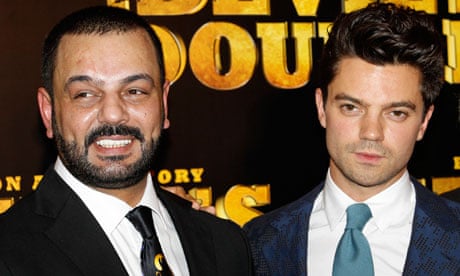This weekend sees the UK release of The Devil’s Double, a $20m action blockbuster set in the “lawless playground of excess and violence known as Baghdad, 1987”. The film is purportedly based on the true story of Latif Yahia (Dominic Cooper), an Iraqi army captain forced to work as a body double for the eldest son of Saddam Hussein, Uday.
But in all the hype surrounding its release, one important point is in danger of being lost: the story depicted in this film almost certainly never happened.
On the surface, Latif Yahia’s is a compelling tale. While on active service during the Iran-Iraq war, he was summoned to Baghdad to serve as Uday’s “fidi” (or body double). When he refused, he was tortured and forced to undergo cosmetic surgery, so that he might more closely resemble Saddam’s psychotic son.
Miraculously, Yahia escaped Iraq in 1991, eventually settling in Daingean, Co Offaly, where he married an Irish woman and raised a family. In the runup to the 2003 Iraq war, he appeared on most of the major news networks in the US and UK, offering personal insights into life inside the Hussein regime.
Later, he campaigned unsuccessfully for Irish citizenship, becoming an outspoken critic of Ireland’s then minister for justice, Michael McDowell. In 2007, he was the subject of a fawning episode of RTE’s Ryan Confidential programme. At the time, I emailed series producer David Blake Knox to ask if programme makers had attempted to independently verify the truth of any of Yahia’s claims. He replied: “Our goal in this interview is to allow our viewers the opportunity to form their own opinions about his credibility.” I took that as a no.
The late Gerry Ryan wasn’t alone. Ed Bradley of CBS, David Frost of al-Jazeera and John Simpson of the BBC all interviewed Yahia and all took him at his word. This was remarkable. Because from outset, there were holes in his story so wide they might have been visible from outer space. I am not an investigative reporter. All it took for me to realise that there were question marks over Yahia’s credibility was actually bothering to read his books: The Devil’s Double and The Black Hole.
His tales of life as Uday’s body double seemed, to put it mildly, far-fetched. But those were only the beginning. Since fleeing Iraq, he claimed to have taken an Austrian policeman hostage at gunpoint, punched a judge, doused a refugee camp in petrol, enjoyed a love affair with a Saudi Arabian princess (who was later beheaded), become a North Sea ship’s captain and masterminded a diamond smuggling business out of Amsterdam. Each of these claims was as sensational as it was unverifiable.
In March 2007, I visited Yahia at his modest two-up, two-down home in Co Offaly. He sat behind an enormous desk, with an Iraqi flag and ceremonial sword behind him. I put it to him that large portions seemed highly implausible to me. He was not offended. Concern for his family’s safety was the justification he used for any amount of illegal, illogical and/or bizarre behaviour.
He claimed that a squad of Iranian-backed suicide bombers called al-Naki had infiltrated Ireland and were plotting to kill him. Why then, I asked, did he give so many interviews? Why was there a poster advertising his latest book hanging in the window of his local pub? “Since I came here,” he replied, “I don’t want to hide who I am.”
I found his answers evasive and often contradictory. In my article, I wrote that I found it difficult to believe a single word he said. Following publication of that article, I was contacted by an Irish woman named Joanna Cunningham. She first met Yahia in a Dublin nightclub in 1997, when he introduced himself as Khalid al-Kubaisi, an Iraqi air force pilot.
It was only after their wedding that she heard about his claim to have worked as Uday’s body double, a claim she says she always found dubious. Cunningham took out a barring order against Yahia in 2000 and still lives in fear of him today. “It has been very hard for me over the years to see newspapers, TV and radio fawning over him,” she told me. “Nobody ever thought to investigate his claims.”
More recently, Yahia has been investigated by the British journalist Ed Caesar. In nine months, Caesar failed to uncover a single piece of evidence to support Yahia’s claims to have worked as a body double for Uday. Among many other, he spoke to Haytham Ajmaya, a former member of Uday’s inner circle, and Raad al-Sheikh, a private guard at Saddam’s presidential palace during the period in question. Both men categorically denied that Yahia had ever worked as a body double for Uday, or indeed that Uday had even used body doubles.
Caesar’s report was published in the Sunday Times on 23 January. At the very least, it should have raised serious doubts over whether any of the events depicted in The Devil’s Double actually happened. Yet with the film about to open at the box office, Yahia is being rolled out once again for another round of interviews, and the British press are once again lapping up this “true story”.
My quarrel here is not with the producers of The Devil’s Double. Their job is to produce an entertaining film that people will enjoy and, by all accounts, they have succeeded. My gripe is with the media, who have a duty to report the truth as best they can, but in this instance have failed abjectly to do so.
